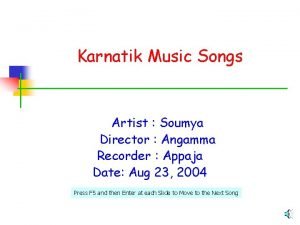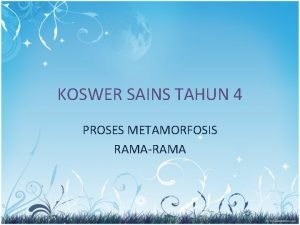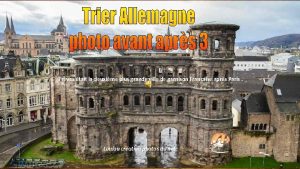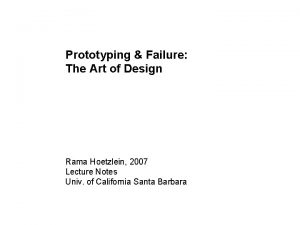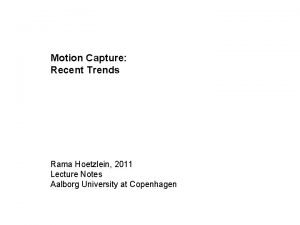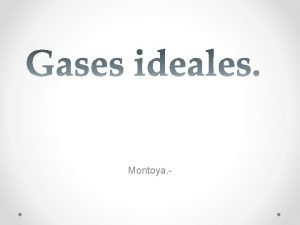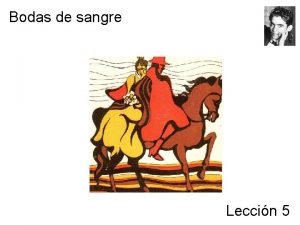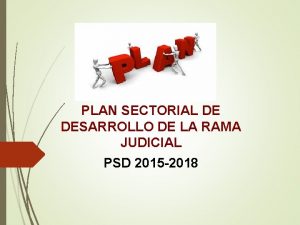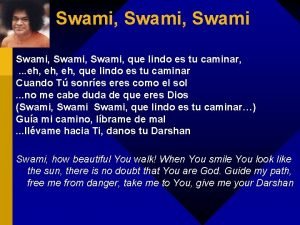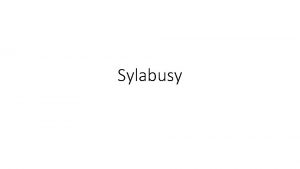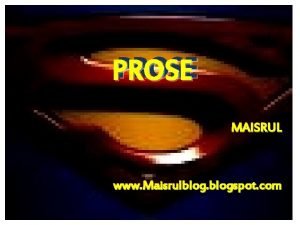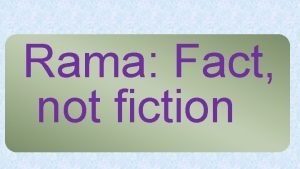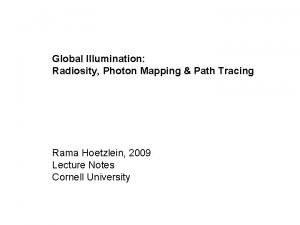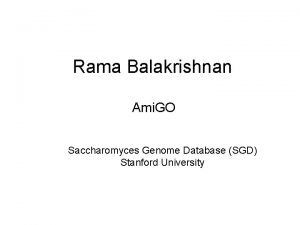D rama Maisrul 08127552934 maisrulyahoo com www roelsite



























- Slides: 27

D rama Maisrul 08127552934 maisrul@yahoo. com www. roelsite. yolasite. com English Department FKIP-UNRI & UIR

History of D rama • The first form of drama was originally from ancient Greek. Dran ‘to perform’ • The performance was initially intended to honor the Gods and the God that used to be associated to this performance was Dionysus, God of wine and crops. • They celebrated the harvest by imitating the human’s daily activity or even the animal in the form of dancing and singing. • That performance later on became drama or play.

History of D rama Some factors of the appearance of drama at that time. q Believe in Gods q A Fear of Starvation (hunger) q The mimitic faculty q The sympathy of magic àWhy these factors become the factors of the appearance of Drama? àWho Know come forward!!

History of D rama • The development of the sssssss play in Greece then became formal performance on the stage for the sake of arts as well as bussiness. • The famous Greek playwright were Sophocles (Tragedy) and Euripides (Comedy). • The theaters were build on the hill side. The audiences heard the dialogue through the echo of the sound on the hill.

Spectators Stage Orchestra & Dancer Sophocles’ theater

Sophocles’ theater Spectators Stage Orchestra & Dancer

History of D rama • The development of the drama was continued as the emerging of Roman Empire. • The playright from Roman that much influenced European drama, especially English Drama, was Seneca was considered as one of the playrights that inspired shakespeare’s works. • So why the English playwrights were much influenced by the Roman the Greek?

History of D rama • Most of the Greek plays were talking about the human that suffered by the Gods. In other word, the human struggles were much influenced by the involvement of the Gods power. • On the contrary, the story of Roman drama that described the human self power or attemp was much more influenced by the success of their struggles and not only depend on the Gods power. • The culture and belieft of the Roman drama were suitable with. European, or it sounds reasonable to accept the story of the Drama.

ROMAN THEATER

ROMAN THEATER

ROMAN THEATER

History of E nglish Drama Maisrul • 081266401251 • 08127552934 • maisrul@yahoo. com • English Department FKIP-UNRI & UIR

History of E nglish Drama • The first form of English drama was called Sacret means holy or spiritual • Sacret was a sort of mini drama that was performed in the Church to celebrate religion festival. The story was based on the holybook. • Sacret then developed into Morality. This Drama was performed in the yard and not in the church anymore. The story was not only from the bibel but also from the author but it still contained a moral lesson as Sacret did.

History of E nglish Drama • Morality was enjoyed by common people because it was performed in the open space in every city or town in England at that time. • The upper class of society or the noble and royal family then developed the performance as what they called as Interlude. • Interlude, like Morality, was also a drama that contained a moral lesson but it only perforemed in the middle of a party or festival of the noblemen and the upperclass.

History of E nglish Drama • Sacret, Morality, and interlude were three forms of early drama in England. • The development of English Drama reached its golden age in Elizabethan period or during Queen Elizabeth reign between the middle of 16 th and early 17 th Century. • At that time the most famoust English playwright William Shakespeare lived.

Shakespeares’ theater Spectators The Stage Actors /Actres

Shakespeares’ theater Spectators The Stage Actors /Actres

Restoration Period • Civil war (the war of roses) between Royal (Round head) Vs Parliament (the cavalier). Parliament defeated the royal and ruled the country, the leader was Oliver Cromwell. • This period was known as Puritan period. Puritan was a group of religion society that wanted to purify their religion thought. One of their roles was no one allowed to show their enjoyment or happiness in front of publict.

Restoration Period • The impact was all theater that have developed during Elizabethan (Shakespeare time) were banned. • Charles II (from the exile in France) came to England struggled for the crown. After long war, he succeeded to overtake the kingdom and ruled the country. • This time was known as restoration period for the changed in many aspects of life he made, including literature like Drama.

Restoration Period The new features of New Drama • The theater was shallower or smaller than theater in Shakespeare time, the stage was moved behind. • The language was much less poetic • The women were introduced as the actress on the stage

Tragedy and Comedy • Maisrul • 08127552934 • maisrul@yahoo. com • English Department FKIP-UNRI & UIR

Tragedy and Comedy • Tragedy was born in Greece in the fifth century B. C, Aristotle (Poetics) define it as an imitation of an action that is serious, complete in itself, and of a certain magnitude (scale/size) … accomplish through incidents that arouse pity and fear… • The word tragedy derives from Tragos (= goat). It maybe taken from the festival to honor the God of Dionysus.

Tragedy and Comedy • In many cases, it is the nature of tragedy that the protagonist or the hero (chief character) must fall from power and from happiness. • In more modern tragedy (on stage or movie), it does not appear in the original one but it’s combined with comedy. • The combination of Tragedy and comedy then it’s

Tragedy and Comedy • Comedy, from the Greek komos/komoidia (=village festival or party), originated to celebrate spring and to praise the God Dionysus, God of fertility and wine. • Two Kinds of Comedy A. Based on the people/character described by the story. B. Based on the way to interpret

Tragedy and Comedy A. Based on the people/character described by the story. • Satiric comedy: Shows a world with less attractive people (ordinary) in which human weakness or folly is ridiculed. • Romantic Comedy is comedy which presents an ideal world, golden world, or a world more delightful than the fact. It portrays people with indulgence/wealthy in everyday world or in some never-never land.

Tragedy and Comedy B. Based on the way to interpret • Comedy High and Low • Comedy High focus on verbal or dialogue as the trigger to make funny. • Ex. Comedy of manner ‘The Importance of being Earnest’ • Comedy low focus on the physically action as the source of the funny. • Ex. Slapstick comedy, Farce, etc

Intro. To Literature Assignment for Drama session • Find out one act play (3 - 5 pages) • Analyze the play: Plot, conflict, setting, character, symbol (if any), and theme. • Do the assignment in group of not more than 5 members. • Submit the task next week!
 Sri rama sri rama sri manoharama
Sri rama sri rama sri manoharama Lagu dari ulat jadi kepompong
Lagu dari ulat jadi kepompong Dậy thổi cơm mua thịt cá
Dậy thổi cơm mua thịt cá Cơm
Cơm 9 rama treves
9 rama treves Matteo rama
Matteo rama Y v rao
Y v rao Ritmo cardiaco irregular
Ritmo cardiaco irregular Junta de clasificacion rama media
Junta de clasificacion rama media Rama hoetzlein
Rama hoetzlein Rama oktavian
Rama oktavian Kademe değişikliğinde rama yönlendirme
Kademe değişikliğinde rama yönlendirme Rama navami wikipedia
Rama navami wikipedia Arben rama
Arben rama Rama hoetzlein
Rama hoetzlein Rama ejecutiva municipal
Rama ejecutiva municipal Ley de gay lussac
Ley de gay lussac Polska rama kwalifikacji
Polska rama kwalifikacji Ecuacion de nernst
Ecuacion de nernst Kademe değişikliğinde rama yönlendirme
Kademe değişikliğinde rama yönlendirme Rama griega e italica
Rama griega e italica Tercera ley de mendel explicacion facil
Tercera ley de mendel explicacion facil Hay muerte mala deja para el amor la verde rama
Hay muerte mala deja para el amor la verde rama Rama
Rama Competent listening
Competent listening Rama balaji
Rama balaji Rama hoetzlein
Rama hoetzlein Ven mi sai rama
Ven mi sai rama
